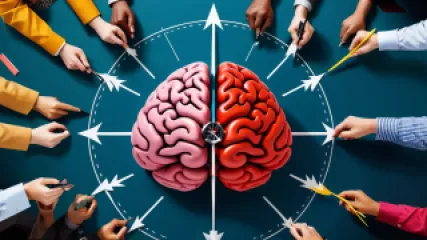Mastering Rational Decision Making: The Ultimate Guide
Decision making is a fundamental aspect of our daily lives. Whether we are choosing what to have for breakfast or making important life-altering choices, our ability to make rational decisions greatly influences the outcomes we experience. However, the process of decision making can be complex and multifaceted, often involving various factors such as emotions, biases, and external influences.
The Importance of Rational Decision Making
Rational decision making refers to the process of making choices based on careful consideration of evidence, logical reasoning, and objective analysis. It involves weighing the pros and cons, gathering relevant information, and evaluating the potential outcomes before reaching a conclusion. Rational decision making is crucial because it enables us to make informed choices that align with our goals, values, and long-term well-being.
While emotions and intuition certainly play a role in decision making, relying solely on these factors can lead to biased and irrational choices. By employing rational decision-making strategies, we can minimize the impact of cognitive biases and make more objective, logical, and ethical decisions.
The Psychology of Decision Making
To understand the principles behind rational decision making, it is essential to explore the field of psychology of decision making. This area of study examines the cognitive processes, biases, and heuristics that influence our choices. By delving into the psychological aspects of decision making, we can gain insights into why we sometimes make suboptimal decisions and learn strategies to improve our decision-making abilities.
One key concept in the psychology of decision making is the recognition of different decision-making styles. These styles reflect individuals' preferences and tendencies when it comes to making choices. Some people may lean towards analytical decision making, carefully considering all available information, while others may rely more on intuition or instinctive decision making.
Understanding these decision-making styles is crucial as it allows us to identify our own preferences and biases, enabling us to develop strategies to enhance our rational decision-making skills.
The Process of Rational Decision Making
Mastering rational decision making involves following a systematic process that helps us evaluate options, assess potential outcomes, and choose the best course of action. While there are various models and frameworks available, we will explore a general five-step process:
- Identify the Decision: The first step is to clearly define the decision that needs to be made. This involves identifying the problem or opportunity and setting specific goals or objectives.
- Gather Information: In this step, it is crucial to gather relevant information about the decision at hand. This includes researching facts, seeking expert opinions, and considering alternative perspectives.
- Evaluate Options: Once the necessary information is gathered, it is time to evaluate the available options. This involves weighing the pros and cons, considering the potential risks and benefits, and aligning the choices with personal values and priorities.
- Make a Decision: After carefully evaluating the options, it is time to make a decision. It is important to consider both short-term and long-term consequences and ensure that the chosen option aligns with the desired outcome.
- Review and Learn: The final step involves reflecting on the decision made and learning from the outcomes. This helps in refining future decision-making processes and improving overall decision-making skills.
By following this systematic process, individuals can improve their ability to make rational decisions and minimize the impact of biases and intuitive shortcuts that often lead to suboptimal choices.
Improving Rational Decision Making
While rational decision making is a skill that can be developed and honed over time, it requires self-awareness, practice, and a willingness to challenge one's own biases. Here are some strategies that can help improve your rational decision-making abilities:
- Recognize Cognitive Biases: Familiarize yourself with common cognitive biases that can influence decision making, such as confirmation bias, availability bias, and anchoring. By recognizing these biases, you can consciously mitigate their impact on your choices.
- Seek Diverse Perspectives: When faced with a decision, actively seek out diverse perspectives and opinions. Engaging with different viewpoints can help you gain a more comprehensive understanding of the situation and make more informed choices.
- Consider the Long-Term Impact: Look beyond immediate gratification or short-term gains and consider the long-term consequences of your decisions. Taking a broader perspective allows for more thoughtful evaluation of potential outcomes.
- Utilize Decision-Making Tools: There are various decision-making tools and techniques available, such as decision matrices, cost-benefit analysis, and SWOT analysis. These tools can provide a structured approach to evaluating options and making rational decisions.
- Practice Self-Reflection: Regularly reflect on past decisions and their outcomes. Identify patterns, learn from mistakes, and celebrate successful choices. Engaging in self-reflection enhances self-awareness and facilitates continuous growth in decision-making skills.
The Ethical Dimension of Rational Decision Making
Rational decision making is not only about logical reasoning and objective analysis; it also encompasses ethical considerations. Ethical decision making involves evaluating choices based on a set of moral principles and values. It requires considering the potential impact on oneself, others, and society as a whole.
When making decisions, it is important to ask yourself questions such as:
"Is this decision fair and just?"
"Does it align with my values and ethical standards?"
"What are the potential consequences for all stakeholders involved?"
By integrating ethical considerations into the rational decision-making process, individuals can ensure that their choices not only benefit themselves but also uphold principles of fairness, integrity, and social responsibility.
Conclusion
Rational decision making is a skill that can be mastered through understanding the psychological aspects of decision making, following a systematic process, and continuously improving one's ability to make informed choices. By recognizing biases, seeking diverse perspectives, considering long-term impacts, utilizing decision-making tools, and integrating ethics into the decision-making process, individuals can enhance their rational decision-making abilities and achieve more favorable outcomes.
Remember, mastering rational decision making is an ongoing journey that requires practice, self-reflection, and a commitment to personal growth. Embrace the process, and empower yourself to make healthy and impactful choices in all areas of life.






